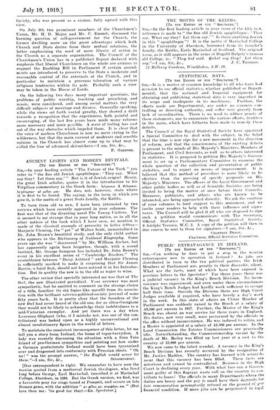A CONFERENCE OF MODERN CHURCHMEN. [To THE EDITOR OF THE
" SPECTATOR.".1 SIR,—The Conference of Churchmen of Modernist tendencies, which is held every year under the auspices of the Church- men's Uuion, met this year on July 7th in London. It is a meeting not only for reading of papers and discussion, but also for common worship and social intercourse. The discus- sions were held in the Kensington Town Hall, and had a wide range, the general subject being the nature of the ideals of modern Churchmen, and how to realize them.
The opening paper, by Professor Percy Gardner, dwelt on the prospects of reform and progress held out in the published Reports of the various Committees of the Archbishops. He showed that the urgent needs of restatement of belief, of reform in the services of the Church, of wider education of the clergy, needs on width modern Churchmen had long been earnestly insisting, were .stated in the clearest way in the Reports on the teaching office of the Clturch, and on its services. The function of liberal Churchmen is thus changed; it becomes their duty not so much to suggest reforms and restatement as to urge the carrying out of such as are acknow- ledged to be of pressing importance.
On July 8th two important and interesting meetings took place. In the morning ProfessorMatthews, of King's College, and Mr. H. Wilson discussed the subject of the Church, catholic, national, and denominational. It was evident that those present were generally strongly in favour of closer rela- tions between the English Church and the Nonconformist bodies, especially in the matter of exchange of pulpits, an understanding long overdue, and now made urgently necessary by the experience of missionaries in the East and of chaplains at the seat of war. In the afternoon Professor Caldicott strongly maintained not only that missionary work in the heathen world had a strong claim.on liberal Churchmen, but alio that such work could now only be carried on satisfac- factorily if what is good in non-Christian religions be frankly appreciated, and Christianity be adapted in a measure to the national character and tendencies of such countries as India and China. Mr. Lenwciod, Secretary of the London Missionary
Society, who was present as a visitor, fully agreed with this view.
On July 9th two prominent members of the Churchmen's Union, Mr. H. D. Major and Mr. C. Emmet, discussed the burning question of self-government for the Church, the former dwelling more on the great advantages which both Church and State derive from their mutual relations, the latter emphasizing the need of more liberty of action in the Church as a separate organization. The Council of the Churchmen's Union has in a published Report declared with emphasis that liberal Churchmen on the whole are anxious to support the Enabling Bill in Parliament if certain amend- ments are introduced to preserve to the State a moderate and reasonable control of the externals of the Church, and in particular to maintain a generous toleration of various religious tendencies within its pale. Probably such a view may be taken in the House of Lords.
On the following two days many important questions, the problems of public worship, teaching and preaching, and music, were considered, and among social matters the very difficult subjects of marriage and divorce. Generally speaking, while the views set forth varied greatly, they showed a drift towards a recognition that the experiences, both painful and encouraging, of the last five years have made many reforms more necessary and more possible. A wave of feeling has cast out of the way obstacles which impeded them. It is clear that the voice of modern Churchmen is now no mere crying in the wilderness, but that the main current of moderate and sensible opinion in the Church has almost come up to what may be called the line of advanced skirmishers.—I am, Sir, &c., P. GARDNER.



































 Previous page
Previous page